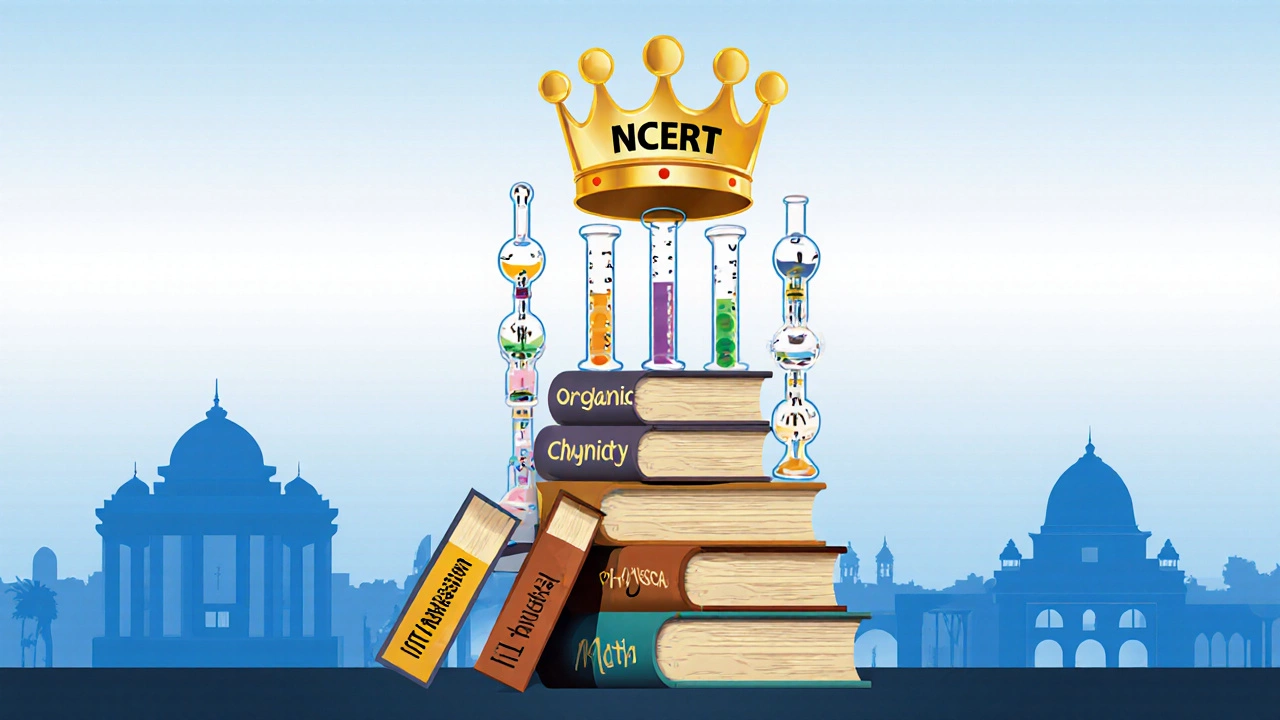JEE Subject Score Estimator
Score Calculator
Score Analysis
Chemistry Tip: With scores of 80+ in Chemistry, you can compensate for lower scores in Physics or Math. Based on data, Chemistry has the highest average score (68.4 in 2024) compared to Physics (56.2) and Math (52.8).
⚠️ Strong Chemistry needed! To clear cutoffs, aim for 85+ in Chemistry to compensate for weaker Physics or Math scores.
If you're preparing for JEE, you've probably asked yourself: What is the most scoring subject in JEE? The answer isn't simple, but it’s not mysterious either. It depends on how you study, what you’re good at, and how the exam is structured each year. But if you want to maximize your score with the least amount of guesswork, there’s one subject that consistently gives students the biggest return on effort: Chemistry.
Why Chemistry Is the Most Scoring Subject in JEE
Chemistry in JEE Main and Advanced doesn’t demand the same level of deep problem-solving as Math or the heavy conceptual lifting of Physics. Instead, it rewards consistency, memory, and pattern recognition. You can score 80-90 out of 100 in Chemistry if you’ve covered the syllabus thoroughly and practiced past papers.
Take a look at the last five years of JEE Main data. In 2024, the average score in Chemistry was 68.4 out of 100. In Physics, it was 56.2. In Math, it was 52.8. Why? Because Chemistry has more direct, factual questions. You don’t need to derive formulas from scratch. You just need to know the reaction, the name, the property, or the exception.
Organic Chemistry alone gives you 30-35 marks just from named reactions and mechanisms. If you memorize 15 key reactions-like Friedel-Crafts, Cannizzaro, or Haloform-you’ve already locked in 15-20 correct answers. Inorganic Chemistry? Memorize the periodic table trends, the color of compounds, the magnetic properties of transition metals, and the exceptions in s-block elements. That’s another 25-30 marks. Physical Chemistry? It’s math-heavy, yes, but the formulas are limited. You’ll see the same 10-12 equations repeat every year: mole concept, equilibrium, thermodynamics, electrochemistry, kinetics.
How Physics and Math Compare
Physics is tough because it tests your ability to visualize and apply concepts. A single question might combine kinematics, vectors, and energy conservation. You can’t just memorize-you have to think on your feet. And if you misread a diagram or misapply a formula, you lose the whole question. In 2023, nearly 40% of students scored below 40 in Physics, even if they were strong in other subjects.
Math is even more unforgiving. It’s not just about knowing the formula. You need speed, accuracy, and the ability to spot the trick in a question. A problem might look like a quadratic, but it’s really testing your understanding of logarithms and inequalities. One small mistake in algebra, and you’re stuck. In JEE Advanced, Math often has the lowest average score among the three subjects.
That’s not to say Physics and Math aren’t important. They are. But if your goal is to maximize your score with minimal risk, Chemistry is your safest bet. It’s the subject where you can turn 20 hours of focused revision into 30+ marks.
The Real Strategy: Balance, Not Just Focus
Some students think, “If Chemistry is the most scoring, I’ll ignore Math and Physics.” That’s a trap. JEE doesn’t let you pass with just one subject. You need a minimum score in each. But you don’t need to be perfect in all three. You need to be strong in one, decent in two.
Here’s how top scorers do it:
- Master Chemistry first-get it to 85+ out of 100
- Build Physics to 60-70-focus on mechanics, electricity, and modern physics
- Keep Math at 50-60-stick to high-weightage topics: calculus, coordinate geometry, algebra
This approach works because Chemistry lifts your overall score, giving you a buffer. If you have a bad day in Physics or miss a tricky Math question, Chemistry carries you. In 2022, a student who scored 88 in Chemistry, 62 in Physics, and 54 in Math cleared the JEE Advanced cutoff with an All India Rank under 1,200. That’s the power of a strong Chemistry base.

What Topics in Chemistry Give You the Most Marks?
Not all parts of Chemistry are equal. Here’s where to focus your time:
- Organic Chemistry (35-40 marks): Named reactions, reagents, mechanisms, isomerism, and functional group conversions. Don’t skip carbonyl compounds-they show up every year.
- Inorganic Chemistry (30-35 marks): Periodic table trends, coordination compounds, qualitative analysis, and exceptions (like why Zn²⁺ is colorless or why Cr³⁺ has a high CFSE). Memorize the colors of ions and magnetic behavior of complexes.
- Physical Chemistry (25-30 marks): Mole concept, chemical equilibrium, thermodynamics, electrochemistry, and kinetics. These are formula-based, but the questions are predictable. Practice 10-15 problems from each topic.
Pro tip: Use flashcards for inorganic facts. Write down every reaction you see in past papers. Do this for 15 minutes every day. After a month, you’ll recognize 90% of the questions before you even read them.
Common Mistakes Students Make
Even when students know Chemistry is scoring, they still lose marks. Here’s why:
- Ignoring NCERT: Over 70% of JEE Main Chemistry questions come directly or indirectly from NCERT textbooks. If you’re using only coaching material, you’re missing the foundation.
- Memorizing without understanding: You can’t just memorize “this reaction gives this product.” Know why it happens. Why does SN2 prefer primary halides? Why does Fe³⁺ form a blood-red complex with SCN⁻? Understanding helps you handle twisted questions.
- Skipping numericals in Physical Chemistry: Students think it’s just theory. But JEE loves numericals on equilibrium constants, pH calculations, and rate laws. Practice at least 5 numericals daily.
- Not solving past papers: The same patterns repeat. If you haven’t solved the last 10 years of JEE papers, you’re guessing instead of preparing.

Real Example: How a Student Scored 94 in Chemistry
A student from Delhi, preparing for JEE 2025, started with Chemistry last. He scored 42 in a mock test. He changed his approach:
- He read NCERT Organic Chemistry twice, wrote down all reactions in a notebook, and reviewed them every morning.
- He made flashcards for every transition metal ion and its color, magnetic property, and common compound.
- He solved 20 Physical Chemistry numericals every day from previous JEE papers.
- He took one full Chemistry mock every Sunday and analyzed every wrong answer.
By the time JEE Main rolled around, he scored 94/100 in Chemistry. He didn’t need to be a genius in Math or Physics-he just needed to be consistent in Chemistry. He got into IIT Roorkee.
Final Advice: Play to Your Strengths
There’s no magic subject. But if you want to increase your chances of getting into an IIT, Chemistry is the subject that gives you the most control. You can’t control how hard a Physics question is. You can control whether you’ve memorized the right reaction or understood the periodic trend.
Don’t chase perfection in all three. Chase mastery in one. Build your confidence with Chemistry. Let it be your anchor. Then, use that confidence to tackle the others.
Remember: In JEE, it’s not about being the best in everything. It’s about being smart enough to know where to put your energy. Chemistry is that place.
Is Chemistry really the most scoring subject in JEE?
Yes, based on data from the last five years of JEE Main and Advanced, Chemistry consistently has the highest average scores among the three subjects. Students who thoroughly cover NCERT and practice past papers often score 80+ out of 100 in Chemistry, while Physics and Math averages are typically 10-15 points lower.
Can I skip Math and Physics if Chemistry is the most scoring?
No. JEE has a minimum qualifying cutoff in each subject. You can’t pass with only Chemistry. But you don’t need to be top-ranked in all three. Focus on getting Chemistry to 85+, then aim for 60+ in Physics and 50+ in Math. That’s enough to clear the cutoff and compete for top ranks.
Which part of Chemistry is easiest to score in?
Organic Chemistry is the easiest to score in because it’s based on reactions and patterns. If you memorize 20 key reactions and understand their mechanisms, you can answer 10-12 questions correctly. Inorganic Chemistry also gives quick marks if you know periodic trends and compound colors. Physical Chemistry requires practice, but the questions are repetitive.
Should I rely only on coaching material for Chemistry?
No. Over 70% of JEE Main Chemistry questions come directly from NCERT textbooks. Coaching material is helpful for practice, but NCERT is your foundation. Read it twice-once for understanding, once for memorization.
How many hours should I spend on Chemistry daily?
If you’re serious about scoring high, spend at least 90 minutes daily on Chemistry. Break it into 30 minutes of theory (NCERT), 30 minutes of reactions (flashcards), and 30 minutes of numericals or past paper questions. Consistency beats cramming.
Is JEE Advanced Chemistry harder than JEE Main?
The topics are the same, but JEE Advanced questions are more application-based. You might get a question that combines organic synthesis with stereochemistry and reaction mechanisms. But if you’ve practiced past papers and understand the why behind reactions, you’ll handle it. The scoring potential is still higher than Physics or Math.
